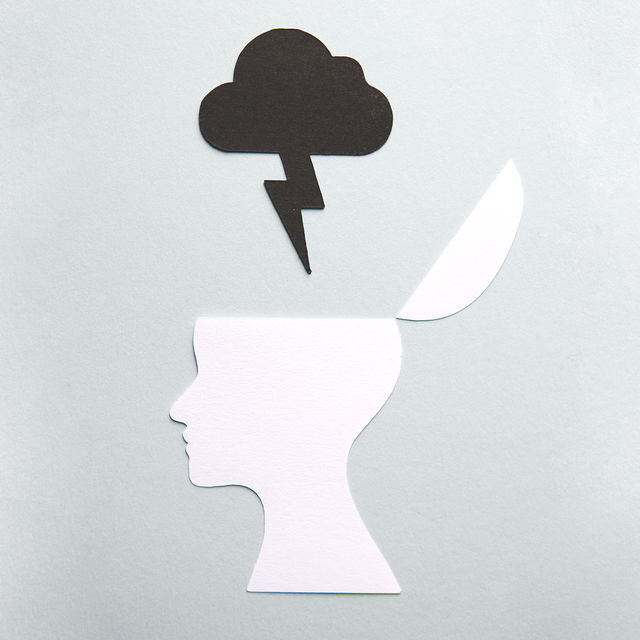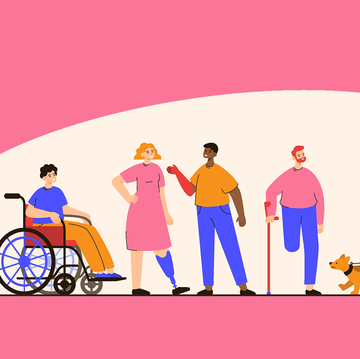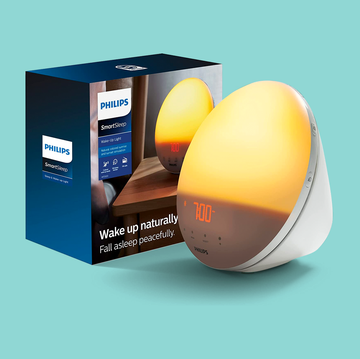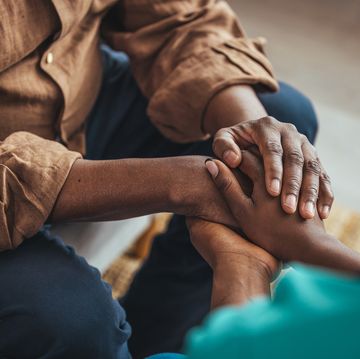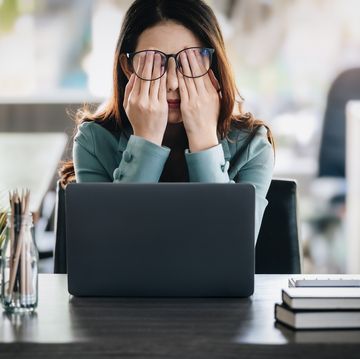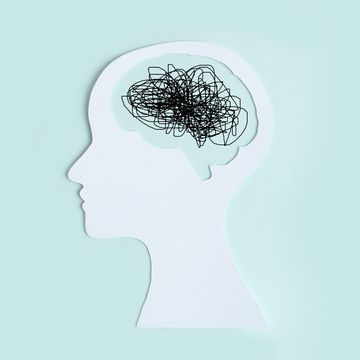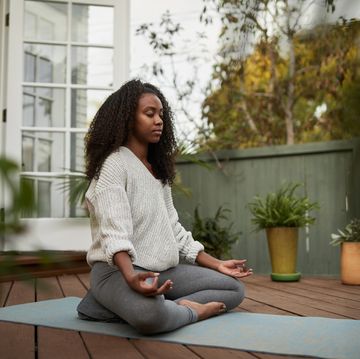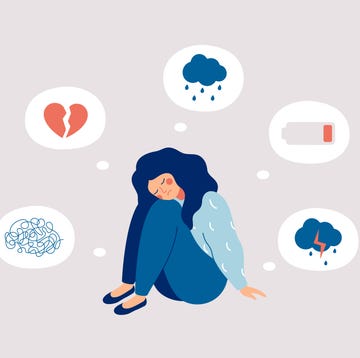More people than ever are experiencing feelings of anxiety, isolation, and fear during the novel coronavirus pandemic — and there has been an onslaught of data-based evidence that suggests Americans may be more likely then to develop depression. A landmark study completed by the U.S. Census Bureau and five different federal agencies found that a third of Americans, on average, are struggling during the COVID-19 pandemic; 47% of young adults between 18 and 29 within the study's 40,000 participants have exhibited symptoms associated with clinical depression since the pandemic began. A new Harris Poll found that one in four Americans report a lack of energy or sleep in their new routines, with women being more likely to experience these negative impacts than men (42% versus 34%, respectively). And even if people aren't losing sleep or can't drag themselves off the couch, it's hard for many people to feel truly happy as the pandemic rages on. The COVID Response Tracking Study, conducted by the NORC at the University of Chicago, found that only 14% of Americans feel "very happy," which suggests Americans are more unhappy now than in any of the last 50 years' of previously compiled data.
But when do feelings of unhappiness, loneliness, or general anxiety turn into something that you're not able to deal with on your own? All of the data compiled by scientists during the pandemic suggests that some Americans may be experiencing these symptoms for the first time. Below, experts recount telltale warning signs associated with depression, how you might work to overcome them at home, and when you should reach out to a professional for help.
What are common symptoms of clinical depression?
The earliest warning signs of depression may be quite familiar, says Wayne Jonas, MD, executive director of Samueli Integrative Health Programs (which partnered with the Harris Poll to learn how the pandemic is affecting Americans' mental health). He tells Good Housekeeping,"Early on in depression, people may feel hopeless, no longer enjoy previously beloved activities, or experience mood swings or changes in energy levels or appetite." Depression affects everyone differently, however, and while a loss of appetite or sleep is common, these aren't the only symptoms of depression that may affect you.
Any number of the following symptoms may begin to manifest if you're developing depression, says Amanda Fialk, PhD, LICSW, LCSW, the chief of clinical services for the mental health services provider The Dorm. The most worrisome to keep an eye on, in addition to those above:
- Feelings of sadness or hopelessness
- Unexplained and frequent irritability
- Anxiety and agitation
- Difficulty concentrating or making decisions throughout the day
- Physical pain, like headaches or lower back pain
- Frequent or recurrent thoughts of death and suicidal thoughts
Why am I developing symptoms associated with depression now?
The pandemic is particularly challenging for those who have had previous issues related to their mental health, whether those issues were depression, anxiety, or addiction. And social distancing efforts and stay-at-home orders may have exacerbated just how hard it can be to manage the symptoms of such issues at home. "The pandemic is truly unprecedented; it impacts almost every aspect of life, is unpredictable and prolonged, and can feel unending and outside of our control," Dr. Jonas explains. "Humans are social animals that don't do well in isolation. As critical as it was to step away from our routines and daily interactions from family, friends, colleagues, and neighbors, it's likely a root cause for feelings of depression."
Fialk says that many people might not even realize that their depression has become an issue because no one is around them to notice or jumpstart a conversation about it. "People struggling with depression tend to want to keep people out and to isolate, but these symptoms are more likely to persist when fewer people are around to notice," she shares. "The distance we're experiencing during the pandemic separates those suffering with depression from their supports; there's no access to coping skills like seeing a friend, taking a class, or heading to the movies."
Even if you're living with a family member or a roommate, a sense of isolation could enhance symptoms of depression that makes it feel like something you've never experienced before.
How can I cope with depression during the pandemic?
If you're recognizing symptoms associated with depression, there are a few ways to begin to manage these feelings at home. "Remember: It is 'physical' distancing that is needed, not actually 'social' distancing, despite the name," Dr. Jonas says.
- Socialize, socialize, socialize. "Higher levels of interpersonal connection are more important now than ever — proactively cultivate a schedule of communication," Fialk advises. "Identify friends and family that you can (and want!) to check in with regularly." You shouldn't rely solely on a psychologist to overcome depressive tendencies, Fialk explains, and you should connect with as many trusted friends or beloved family members as possible, on a regular schedule. Have social hours via FaceTime or Zoom, or even do something more casual like watching a movie or show together via video. If you can, safely (at a distance!) meet in a non-crowded public space outside.
- Supercharge your diet and break a sweat. Dr. Jonas explains what you're eating can be tied to your mood; eating a balanced diet could help you feel more energized throughout the day. That may encourage you to get some form of physical exercise, even if you can't head outside — try yoga or aerobics, or any of the many ways to get your heart pumping in your living room. Exercise releases dopamine in the body, which is a chemical that controls the brain's reward and pleasure assessors (something you may be lacking due to poor stimulation during the pandemic).
- Cut back on alcohol use. Just like getting good sleep and working out can help your brain address stressors during this time, alcohol and drugs can work against your ability to process these feelings. A few drinks throughout the week is understandable, but if you're increasingly thinking of alcohol or mind-altering drugs throughout the day, it's time to see if you can pare back on your own.
- Establish a routine. Yes, it's important to get to sleep on time, shower in the morning, and wear real clothes during a work day at home. "Create a daily routine that prioritizes looking after yourself," Fialk says, adding that it's even smart to create a physical printed schedule that you can follow daily. "Try to incorporate as many activities of your 'former' life into your shelter-in-place life… If there was something you were doing before, see if you can find an online equivalent; like virtual Broadway shows, meetup groups, movies, museum tours, or even classes over the summer."
- Take a break from the news. This is more important for those experiencing depression during the pandemic, when certain symptoms may be triggered around the fear of contracting COVID-19. "For pandemic related news, check reputable sites and give yourself some boundaries — avoid excessive exposure to media coverage of COVID-19," Fialk says. "Take breaks from watching, reading and listening — turn off automatic updates and notifications about the illness. Unplug the live feeds!"
- Talk about what you're feeling, and don't be afraid to ask for help. "Talk about what you're experiencing, about your thoughts and emotions," Fialk advises. "Processing what you are experiencing, thinking, and feeling seems to be a protective factor for not advancing to clinical depression. Don't avoid — don't try to 'forget' about or ignore your thoughts and emotions. Don't numb or medicate them away, and don't minimize what you're going through." Talking about what you're feeling with a trusted loved one can help you reframe negative thoughts; it may let you acknowledge your feelings, and think of alternative positives to focus on instead. "This is a skill that can be learned and practiced, helping to build resilience."
When should I seek professional treatment?
How can you tell when bad days or weeks have turned into a clinical depression that you shouldn't try to address on your own? The answer is complicated, but professional help most often is needed when feelings or tendencies have become persistent and have affected you consistently for more than two weeks.
If you’re considering harming yourself, call 911 or the National Suicide Prevention Lifeline at 800-273-8255. Please reach out immediately if you think about harming yourself or others.
"If lifestyle changes don't help you move past these symptoms, cognitive behavioral therapy may help replace negative or despairing thoughts with positive ones, and could be a first good step," Dr. Jonas says. "Getting the social and emotional care that you need isn't a sign of weakness; it's a sign of courage, and it helps other people in your life as well." Remember that an initial phone call or email doesn't commit you immediately to treatment, so don't be afraid to reach out. More times than not, this conversation can also be had with a doctor who normally treats you — they can refer you to the right professional, too.
If you're unsure of where to start, the following resources are great places to learn more about finding a care provider in your area:
- Virtual counseling: Telehealth providers are also specialized in counseling and psychotherapy. You can get the conversation started on Talkspace, or even find a provider using Psychology Today or ZocDoc, Dr. Jonas shares.
- Emotions Anonymous: This group-based discussion therapy can be a great starting point before moving onto other forms of treatment — and may even be a good way to manage non-clinical symptoms of depression, Fialk says. While EA normally meets in person in community settings, you can join your nearest group online or over the phone during the pandemic.
- National Alliance on Mental Illness: NAMI maintains local offices in all 50 states, and can help you get connected with a healthcare provider in your area as well as other resources.
- Anxiety and Depression Association of America: This national group can also provide resources to help you find local providers, and it's a great place to get educated on all the ways that you can address depression (and pandemic-related anxiety!) during the pandemic.
Zee Krstic is a content strategy manager for Hearst Magazines, focusing on SEO optimization and other editorial strategies for four brands, including Country Living, House Beautiful, ELLE Decor and VERANDA. He previously served as Health Editor for Good Housekeeping between 2019 and 2023, covering health news, diet and fitness trends as well as executing wellness product reviews in conjunction with the Good Housekeeping Institute. Prior to joining Hearst, Zee fostered a strong background in women's lifestyle media with eight plus years of editorial experience, including as a site-wide editor at Martha Stewart Living after developing a nutrition background as an assistant editor at Cooking Light. Zee produces service-based health coverage, as well as design and travel content, for Hearst brands on a contributor basis; he has written about food and dining for Time, among other publications.
